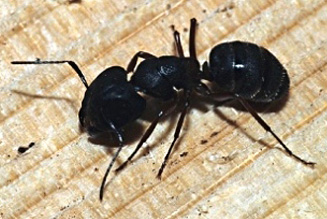

2015-04-01 Dott.sa Carla Petta posted:
Ants (order Hymenoptera) are known as social insects because they live in colonies, in ant nests. A colony consists of one or more fertile females (queens), and many smaller sterile females (workers and soldiers).
LIFECYCLE: The lifecycle of an ant consists of four stages: egg-larva-pupa-adult. The eggs, small, white or yellowish, are laid in huge numbers by the queen (colonies may also contain millions of ants, all produced by a single queen) and, within 2-6 weeks develop into larvae. After being fed for a period ranging from a few weeks to several months, they become pupae. During the pupal stage, the ant remains idle: it feeds and undergoes the profound transformation into an adult insect.
FEATURES: Ants defend themselves by biting with their strong mandibles, or by puncturing. (They belong to the same Superfamily of Vespoidea, which includes wasps.) They can also spray formic acid, which is lethal to many small insects. Some subfamilies have stingers. "Worker" ants are generally sterile, and take care of the entire anthill, collecting food, cleaning, defending the colony, taking care of the eggs, and nurturing and rearing the larvae and pupae. Of interest is that membership of a castefemale, male, workeris determined by the food with which the larvae are fed by worker ants. A low-protein diet will lead to the development of a worker, while a rich diet will produce a queen. Their nests are usually in the ground, often at great depths, and can therefore be extremely difficult to reach. In fact, only sterile individuals emerge from the nest.
DIET: Ants are generally omnivorous, and usually attracted to homes or structures by sugars and proteins, but they will also eat other kinds of food. In times of maximum egg production and brood development, the increased protein requirements cause workers to invade homes, food industries, farms, as well as through aggression against other insects. Although they may also eat aphids, they often do not prey on them, but prefer to defend them, harvesting their sugary excretions, known as honeydew. Of the many species in our region, along with some useful ants from the "rufa" group, we include some that are particularly harmful to man, his activities, and his possessions.
How much it cost?